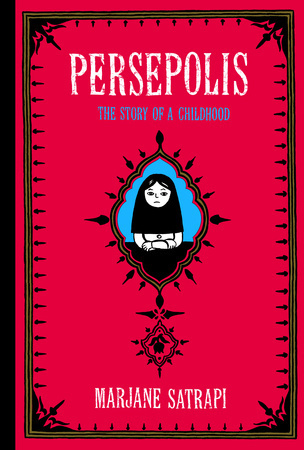Persepolis tells the tale of Iran’s political and cultural development through a little girl’s perspective. One may experience every emotion in the novel, full of happy and sad moments. Simple yet powerful graphics are used to tell the tale. The book Persepolis is courageous, funny, and sincere. It provides a unique look at life in a theocracy.
In the book’s opening pages, Marjane, the author, is getting accustomed to the new Islamic Republic that the revolution produced. The revolution’s backers disavowed their affiliation with it. Some incredibly powerful clergymen took control of their vision of a democratic Iran. The uncertainty experienced by a little child who is instructed by her school to accept the new Islamic administration but witnesses her parents fighting against it is well-revealed in the book. Since the majority of the things she loved were now forbidden, she observes how her life had turned on its head.
All the bilingual schools were suddenly converted to single-sex institutions. The circumstances deteriorated with time. All protests were prohibited once Iran entered the war; dissidents were tortured or executed, and drones were frequently used to assault the country. Every day, Marjane became more adventurous and curious. Her outgoing nature often got her into trouble with the Guardians of the Revolution and the school administration. She was fourteen when her parents decided to move her to Austria.
She was so overwhelmed by her newly acquired independence. She quickly discovered that living alone wasn’t her cup of tea, and she missed her family, culture, and homeland. She chose to go back to Iran because she felt disoriented and guilty. Returning to her native country wasn’t as simple as she had anticipated. Due to the effects of the war, there were very few opportunities for women, and the entire nation’s reputation was damaged. Marjane emphasized the weird and terrible aspects of Iran’s dictatorial government. Marjane succeeded in illuminating complex modern subjects like the veil and feminism, neo-colonialism, social movements, xenophobia, and the perils of fundamentalism.
One quotation very succinctly expresses why theocracies maintain such rigorous control over all facets of their citizen’s lives:
“The regime had recognized one individual leaving her home while pondering, ‘Are my pants long enough? Is my veil in position? Is my makeup visible? Where is my independence of mind, she no longer queries, and “Are they going to whip me? Where is my right to free speech? Is my life manageable? What occurs inside political prisons? Naturally, that is! When we are terrified, we are incapable of thinking critically or reflecting. We become frozen in terror. In addition, all dictators’ repression has always been motivated by fear. It follows that wearing makeup or baring your hair became rebellious behaviors.”
By demonstrating the state’s frantic desire to enact stringent rules to control women based on the patriarchal paradigm of perceiving women as men’s assets, she has consistently worked to question the problematic divide between personal and political. Marjane decides to travel to France towards the novel’s conclusion, and she knows that this trip will take a while. As independence comes at a high cost for others, she said goodbye to her grandmother.
I learned a lot about Iran’s cultural heritage through Persepolis, and it also helped me believe that human interactions are fundamentally universal. To capture the innocence of a child forced to mature due to violence and persecution, Marjane created the text in a style that is almost childlike. This brilliantly written coming-of-age novel offers other characters’ lives equal weight to their own.
The book contained a lot of symbolism as well. Because Marjane perceives the world in black and white, the book comprises black-and-white pictures. Marjane consciously tries to distinguish between good and evil, as well as right and wrong, from the beginning to the end of the story. To explain complex subjects, the author has utilized straightforward language. Since her primary goal is to make the readers realize that various truths exist even when we cannot notice them, she has purposefully employed the cinch style of pictures.
She has also been unafraid to voice her ideas while allowing the readers to draw their own conclusions. Marjane and other Iranian women fight the patriarchy relentlessly throughout the book. This is demonstrated in subtle ways, such as her early defiance toward the authorities at her school, her decision to attend parties while not covering her face, or her socially unacceptable actions, such as leaving her spouse after realizing she wasn’t happy and feeling confined. The author accurately describes her shifting beliefs, rash and careless choices, and brave resistance actions.

